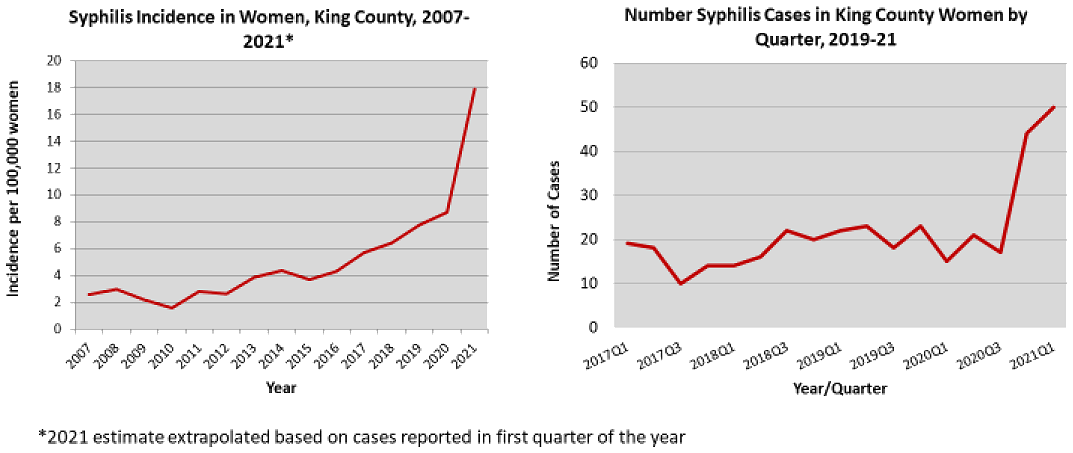Rapidly growing syphilis epidemic among heterosexuals, King County
Health advisory
July 6, 2021
Select a tab below to navigate through sections:
-
Medical providers should test sexually active homeless persons, persons who exchange money or drugs for sex, and persons who use methamphetamine, heroin or cocaine for syphilis when they present for care, including in emergency rooms. Ideally, efforts to expand syphilis testing should be made part of systematic clinical routines in places such as urgent care clinics and emergency rooms and not rely on individual medical providers to remember to order tests each time they see an at-risk patient. Non-pregnant persons without signs or symptoms of syphilis, or a known exposure to syphilis do not require testing more than every 90 days.
- Treat all patients with signs or symptoms consistent with primary or secondary syphilis when they present for care. Clinicians should perform serological tests on patients with signs or symptoms of syphilis, but should not wait for the results of such tests to provide treatment, particularly among pregnant women, persons who are living homeless and other persons for whom medical follow-up is difficult to ensure.
- Test ALL PREGNANT women for syphilis at their first prenatal visit and AGAIN with routine 3rd trimester labs, typically at 24-28 weeks gestation.
- Pregnant women who present late for prenatal care or have fragmented care should be screened for syphilis (along with HIV, HBsAg and STI testing) at presentation and again in the 3rd trimester. This screening should occur at emergency department visits or Labor and Delivery triage visits if prenatal labs have not been obtained. Refer non-contracepting women of childbearing potential diagnosed with syphilis for contraception if the diagnosed woman does not desire pregnancy. All contraceptive options should be offered including permanent and long-acting options.
- Treat any persons who reports sexual exposure to someone with syphilis, even in the absence of signs or symptoms of infection. Treatment is not dependent on the results of serological testing, which can be falsely negative early in infection. Test these individuals for syphilis but treatment should not be withheld awaiting test results.
- Report all cases of syphilis to PHSKC STD Program using the STD Case Report Form.
- Call Alyssa Piraino 206-744-8005, Dr. Lindley Barbee 206-744-2595 or Dr. Matthew Golden 206-744-6829 for syphilis related questions.
In December 2020, Public Health issued an advisory to alert medical providers and the public to a rise in syphilis cases among heterosexuals. Since that time, the syphilis epidemic among heterosexuals in King County has accelerated, with rates among women rising almost 150% since July 2020. Among 51 women with syphilis interviewed by Public Health investigators from July 2020 to April 2021 for whom data are available, 29% were living homeless and 35% used methamphetamine. Twelve percent were pregnant at the time of their syphilis treatment. Almost 90% of cases occurred in residents of central Seattle or south Seattle/King County.
The rise in syphilis cases among heterosexuals has resulted in an increase in congenital syphilis. Congenital syphilis can result in miscarriage, neonatal death, preterm delivery and long-term health problems in the affected child. The congenital syphilis rate in the US more than doubled between 2016 to 2018. After not having any cases for many years, King County has had five cases of congenital syphilis since 2020. Nationally, congenital syphilis most frequently occurs in women who have not had prenatal care or who enter prenatal care very late, though recent cases in King County have generally tested negative for syphilis during their first trimester. These local cases may have been avertable with repeat testing later in pregnancy. In response to the rise in congenital syphilis, PHSKC recommends testing all pregnant women for syphilis when they first seek prenatal care and again in the early third trimester, at approximately 24-28 weeks gestation. Pregnant women not engaged in routine prenatal care should be tested at any time they engage with the health care system (i.e. the emergency department, jail, urgent care, or other clinic visits).
For questions regarding these treatment recommendations please contact Dr. Lindley Barbee (lindley.barbee@kingcounty.gov), or Dr. Matthew Golden (matthew.golden@kingcounty.gov). For other clinical questions about STI, contact either Dr. Barbee or Dr. Golden or use the National Network of Prevention Training Centers Clinical Consult Line (www.stdccn.org).

 Translate
Translate
